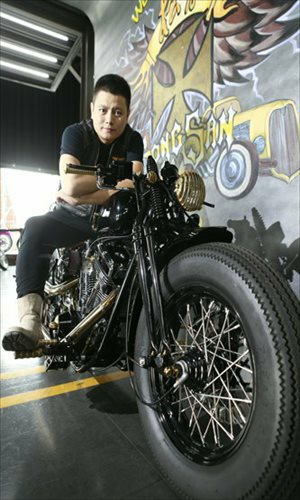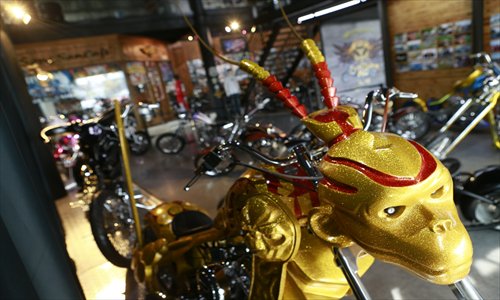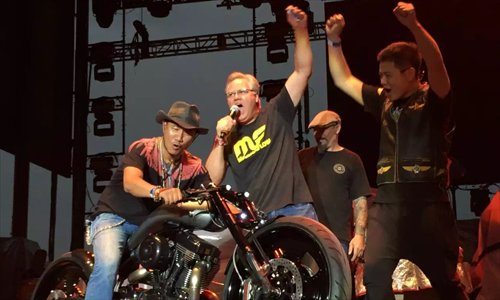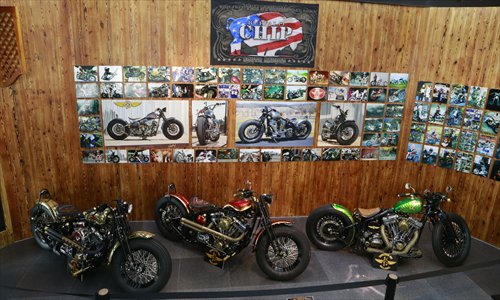China’s ghost riders

Songsan Xiaolei poses, with one of the motorcycles in the collection at his motorcycle museum in Beijing. Photo: Li Hao/GT
The boastful plaything. The punk jeans and jackets. The embodiment of a heroic spirit - fearless, adventurous and eager to conquer. What could be cooler, more classic and more masculine than riding a chopper or café racer motorcycle on a suburban highway?
Chinese businessman Zhang Xiaolei, 41, more commonly known as Songsan Xiaolei in the local motorcycle enthusiast community, loves motorcycles so much that he hopes to introduce more upper-end and custom motorcycles to China's rising elite and the newly wealthy, to grow the country's motorcycle circle.
"When my friends and I strolled through the bike builders and crowds looking at the rides and exhibits at the Sturgis Motorcycle Rally [an annual week-long carnival for motorcycle enthusiasts from around the world] in the US in August, we were frequently asked if we came from Japan," said Xiaolei.
"Westerners didn't know Chinese people are also very interested in premier motorcycles."
"China's motorcycle culture is still in its fledging stage where bikers often pursue exaggerated motorcycle designs to show off their personality," said Xiaolei.

The Monkey King motorcycle made especially for the movie. Photos: Li Hao/GT
Motorcycles with Chinese elements
One would be stunned when stepping into the SongSan World Top Cycle Museum near the entrance to the Beijing Golden Port Motor Park located in the suburbs of the Chaoyang district. The museum, also the base of the SongSan Motorcycle Club, was co-founded by Xiaolei and other custom motorcycle enthusiasts including singer, Yang Kun.
The more than 700-square-meter showroom displays an array of motorcycles, including WCC (West Coast Choppers), OCC (Orange County Choppers), and US models like American Bobber and American Chrome.
The most eye-catching one in the collection is the original that Nicolas Cage rode in the 2007 Hollywood supernatural movie, Ghost Rider.
In 2013, Xiaolei outbid buyers from the Middle East and Europe at an auction of Hollywood movie props in the US, paying 2,600,000 yuan ($408,200) to become the motorcycle's new owner.
"Before the auction I had closely tracked updates about this model, and was determined to secure it," said Xiaolei.
For him, Ghost Rider tells a lot about the American motorcycle culture: a day-time biker who transforms into a ghost at night, fearlessly fighting against evil in his pursuit of justice.
In 1999, Xiaolei started building custom bikes. Among his works is a set of motorcycles specially made for the action and fantasy movie The Monkey King (2014), starring Chow Yun-fat and Donnie Yen.
Each of the main characters, Monkey King, Lord Erlang and White Bone Demon, has their image emblazoned on a motorcycle. The bikes were all on display in the US when the movie hit the big screen.
"In the US, almost every man with a stable life dreams of being on a motorcycle or of being a cowboy. [For example, Wisconsin Governor Scott Walker who joined the American Presidential race is a fan of Harley-Davidson motorcycles]. When the Chinese wanted to promote the movie among Americans, we believed that the motorcycles are the starting point for appealing to a wider audience," explained Xiaolei.
"We also think it is a perfect mix of the Chinese spirit and American motorcycle culture."

Chinese movie star Hu Jun poses on a custom motorcycle at the Sturgis Motorcycle Rally. Photo: Courtesy of Zhang Xiaolei
The Harley-Davidson influence
When Americans Will Harley and the Davidson brothers successfully made the world's first Harley-Davidson motorcycle at a log cabin in Milwaukee in the US in 1903, they could never have imagined that their bikes would become trendy playthings in the far east of China 100 years later.
Like many others, Xiaolei's passion for motorcycles started with Harley-Davidson. He was among the first batch of Chinese motorcycle enthusiasts to own one of these prestigious bikes.
Passionate about motorcycles since childhood, he bought a Harley-Davidson 883 model in Guangzhou, Guangdong Province in 1995 in an off-the-record way (They were not yet legally sold in China).
In 1996, the motorcycle fanatic embarked on a road trip, spending 10 days riding from Los Angeles to Florida in western America, stopping at Harley-Davidson stores along the way to find parts to modify and personalize his motorcycle.
A decade later, the number of Harley-Davidson owners in China has grown dramatically since the American company officially entered the Chinese market in 2005.
In China, a Harley-Davidson is priced between 120,000 yuan and 400,000 yuan.
"Most Chinese owners are aged between 35 and 45, and most of them are well off. They are also familiar with foreign culture, wanting to express their personality and willing to take challenges," Gao Jinxin, president of Harley-Davidson China, was quoted as saying in the Yangcheng Evening Post in 2014.
The Chinese owners are the newcomers to the Global Harley Owners Group (HOG). Local HOGs have been founded in China's major cities including Beijing, Shanghai, Qingdao in Shandong Province and Chengdu in Sichuan Province.
In Beijing alone, there were about 700 Harley bikers in 2014, according to the Beijing Youth Daily. Some riders have founded their own, smaller Harley riding clubs.
The capital however, is not the most suitable city to enjoy a motorcycle ride. One of the challenges is that motorcycles are banned on the main roads of the second, third, fourth and fifth ring roads throughout the day.
"The bikers often gather at weekends in Beijing's suburbs, enjoying a ride on the mountain roads," said Xiaolei.
Sometimes he and his friends will transport their motorcycles to regions in Yunnan Province and the Xinjiang Uyghur Autonomous Region to ride.

The rides exhibited at the SongSan World Top Cycle Museum. Photo: Li Hao/GT
Material worth
Although Harley-Davidson has helped foster the motorcycle culture in China, some riders are against the idea of integrating the American dream, the spirit of freedom and independence, with the Harley bike.
"Harley is just one of many playthings made by the Americans. In China it is not even considered as a vehicle for transportation, but a way to showcase your personality," Zhao Hui, who became the first authorized reseller of Harley-Davidson motorcycles in Beijing in 2005, was quoted as saying in the Southern Weekly in 2010.
In his opinion, many nations around the world are advocates for freedom and an independent, uninhibited personality, and the Americans just luckily happen to be the first to incorporate that spirit into a material thing.
Custom made in China
In Xiaolei's opinion, true motorcycle enthusiasts should try to build their own custom bikes.
At the Sturgis Motorcycle Rally in South Dakota, Xiaolei took his custom work, the Spider Café Racer, featuring an old-school shape and the capability of accelerating to 100 kilometers per hour within three seconds, to the Rat's Hole Custom Motorcycle Competition. To his surprise, the Spider Café Racer won the best model title.
The award, voted by professional builders and spectators, represents the world's highest level in custom motorcycles.
"I was over the moon at the result. I have traveled to the US and Europe so many times to participate in motor festivals and finally I have realized my dream as a builder," said Xiaolei.
Still, there's a more critical question facing the development of custom motorcycle culture in China - how to get a license from government to allow it on the country's roads.
"Custom motorcycles are often produced by US motorcycle manufactures, where the standards for environmental protection are not as strict. Therefore, we sent the engine to be refined in Europe where the standards are similar to China. After that, the motorcycles went back to the US to undergo a safety check," said Xiaolei.
Xiaolei said China needs a responsible motorcycle culture.
All bikers should possess the certificates needed before hitting the road. Bikers should also not disturb traffic in city centers.
"However, it will still take years for the public to change their stereotypical thinking that bikers are outlaws or noisemakers," he said.
"Only if all bikers obey the regulations, will China have more people interested in motorcycles."